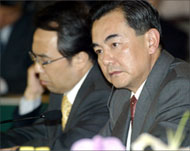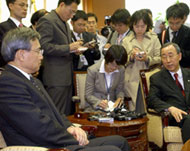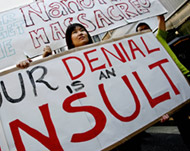Koizumi shrine visit sparks outrage
Japanese Prime Minister Junichiro Koizumi has paid homage at a Tokyo shrine for war dead that is seen by critics as a symbol of Japan’s militaristic past, drawing swift and angry protests from China and South Korea.

Beijing called the visit a “serious provocation” while Seoul expressed “deep regret and disappointment”.
“The Chinese government firmly opposes Prime Minister Koizumi
worshipping the Yasukuni Shrine, which enshrines A-grade war criminals,” China’s ambassador to Japan Wang Yi said in Tokyo, according to the Xinhua news agency.
Xinhua said Wang “strongly criticised” Koizumi’s visit, taking particular offence as it came on the day China’s second manned spacecraft returned safely to Earth.
“[October] the 17th is the day of the victorious return of China’s manned space flight Shenzhou VI and the Chinese people are celebrating.
“Koizumi’s visit to the Yasukuni shrine on this day is a serious provocation to all the Chinese people,” Wang said.
Private capacity
Koizumi – clad in a dark suit rather than the traditional Japanese clothing he has worn on some past visits – bowed, put his hands together in prayer and stood silently in front of an outer shrine for a moment before striding back to his car in front of a crowd that had gathered in a drizzling rain.
 |
|
Chinese envoy Wang Yi ( R) called |
He did not enter an inner shrine as he has in the past and made no remarks. Chief Cabinet Secretary Hiroyuki Hosoda told reporters the visit was made in a private capacity.
Japanese media said the low-key atmosphere appeared to be an attempt to mute the expected backlash from China and South Korea as well as domestic critics.
The visits to the Tokyo shrine, which honours 2.5 million
Japanese war dead including some executed war criminals, have strained ties with China and South Korea, two countries that suffered immense losses during Japan’s invasion during the second world war.
Seoul summons ambassador
South Korean Foreign Minister Ban Ki-moon summoned Japanese ambassador Shotaro Oshima to complain.
 |
|
Seoul’s Ban Ki-moon (R) |
“We strongly protest the visit to Yasukuni shrine despite our request and strongly urge that it is not repeated,” Ban said in Seoul.
“The South Korean government cannot help feeling deep regret and disappointment over the visit,” Ban told Oshima.
“It is not excessive to say that Prime Minister Koizumi’s visits to the Yasukuni shrine have been the biggest stumbling block to South Korea-Japan relations,” he added.
Embassy warning
Japan’s embassy in Beijing advised Japanese nationals to stay away from areas that could be potential flashpoints for anti-Japan demonstrations, such as those in April.
“If we are asked, of course we would advise them to be careful,” an embassy spokesman said. “I hope it will not trigger any violent reactions.”
Even before Monday, Japan’s relations with China and South Korea have been at a low ebb over Koizumi’s four previous visits to Yasukuni as well as war-time memories, including a Japanese history textbook that Beijing said downplayed Tokyo’s war-time atrocities.
 |
|
In April, China saw several anti- |
In April, China was rocked by a wave of anti-Japanese street demonstrations.
“With the visit, the barriers separating Japan and China will be set higher again and China’s distrust of Japan will grow further,” said Kazuyoshi Sakamoto, a professor of international politics at Tokyo University.
Differing public opinion
Since taking office, Koizumi has kept his pledge to pray annually at Yasukuni, a holy site for the Shinto faith that was built in June 1869.
Koizumi’s latest visit comes despite a ruling last month by a Japanese high court that the visits violated the constitution.
|
“I cannot agree with his argument that his visits are private in nature. Do you have anything private when you become a prime minister? I don’t think so” Student Ayumi Motomura |
Despite the ruling, Koizumi has insisted he is not making his pilgrimages as part of the prime minister’s official duties but to express his personal grief over people killed in war.
At the shrine on Monday, views on the visits reflected mixed public opinion in Japan as a whole.
“I think many people in my generation feel the same way as I do. We received our education during the war. I cannot help but to come to Yasukuni,” said 79-year-old Sakae Shinnobu, whose elder brother died in the war fighting in the Philippines and has a strand of hair in the shrine.
Ayumi Motomura, a 22-year-old student, came along to catch a glimpse of the prime minister but said she was unsure whether she supported the visits.
“I am not sure if this is good or bad. But I cannot agree with his argument that his visits are private in nature. Do you have anything private when you become a prime minister? I don’t think so,” she said.